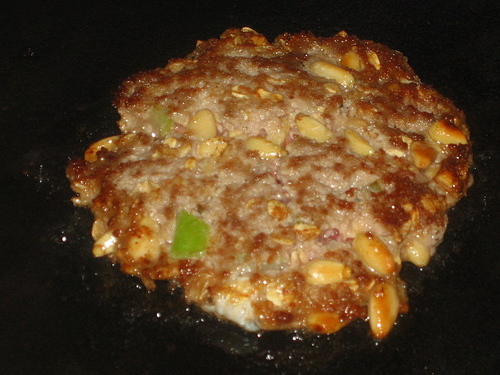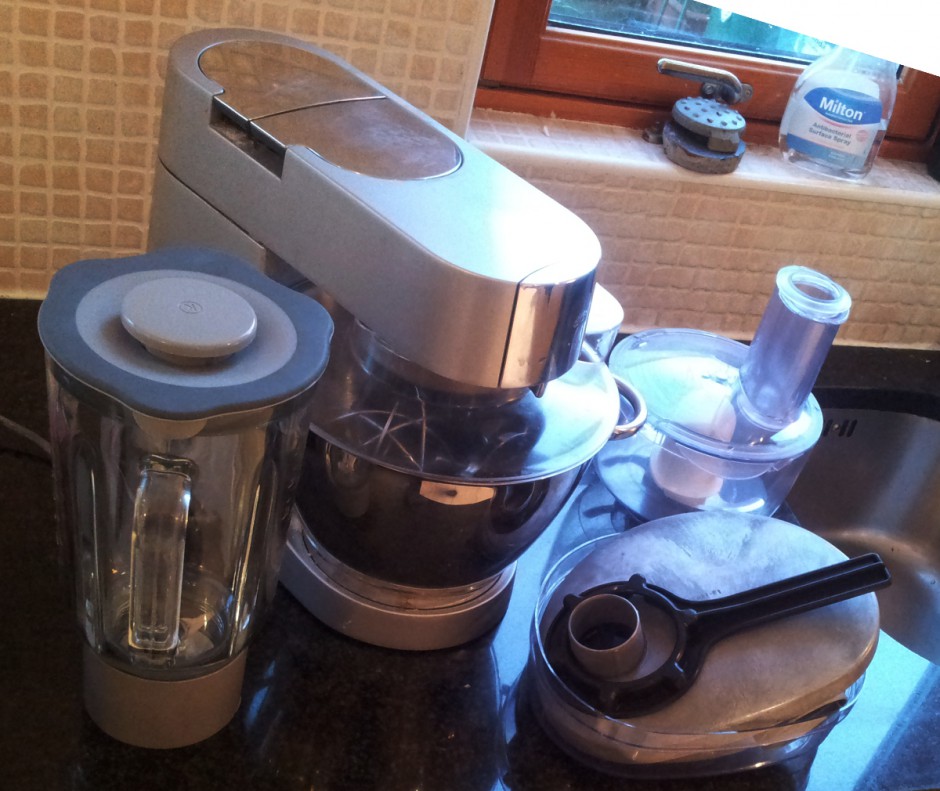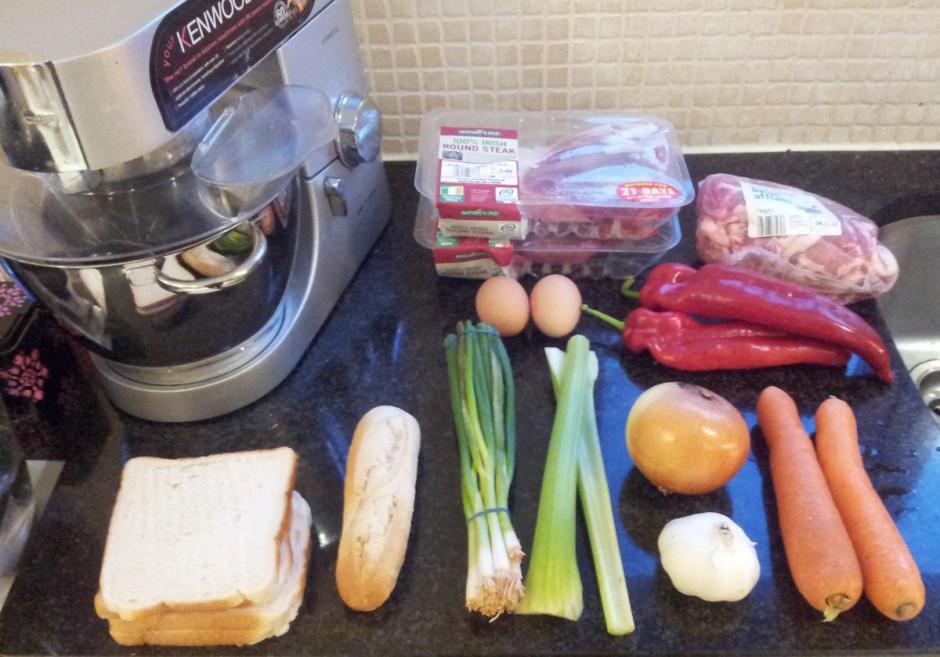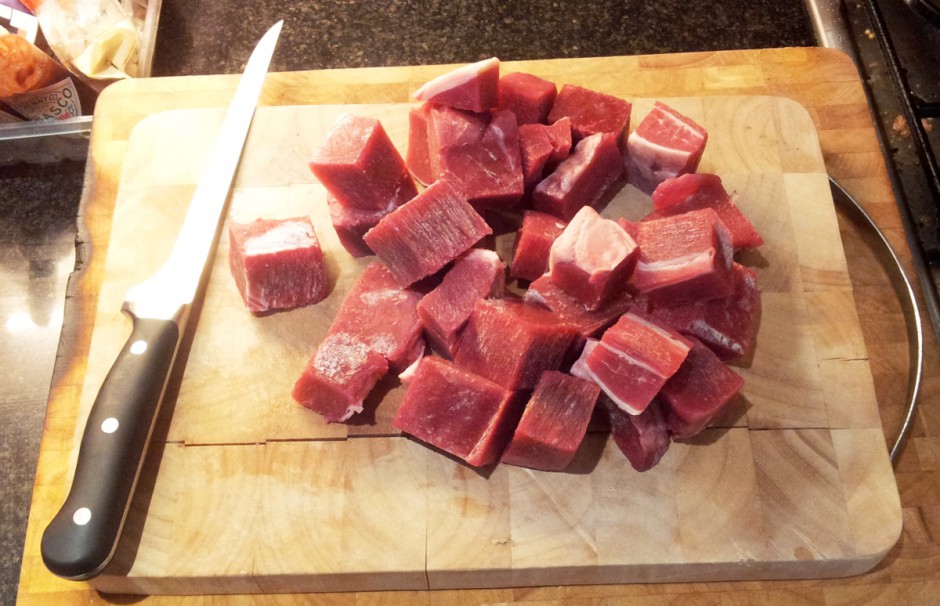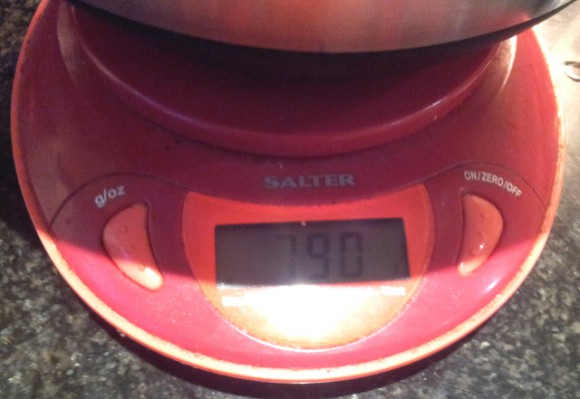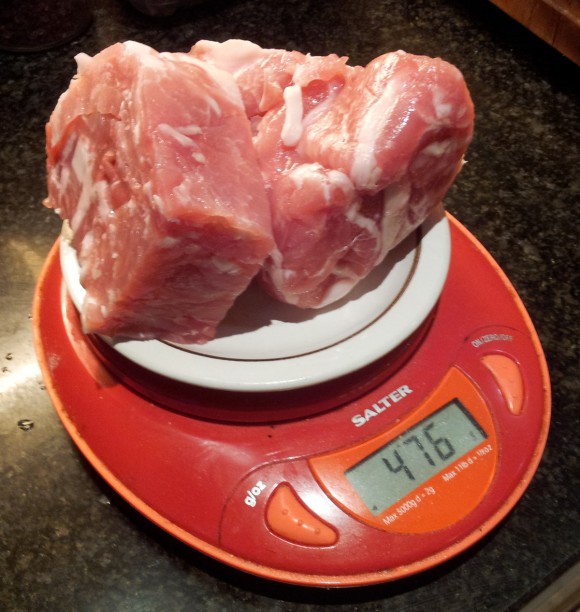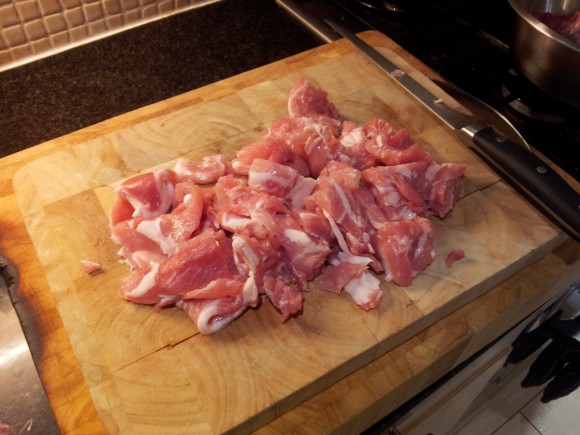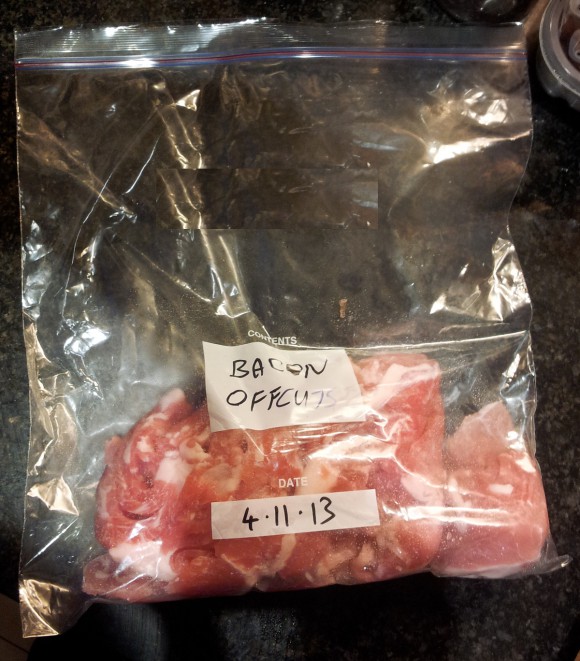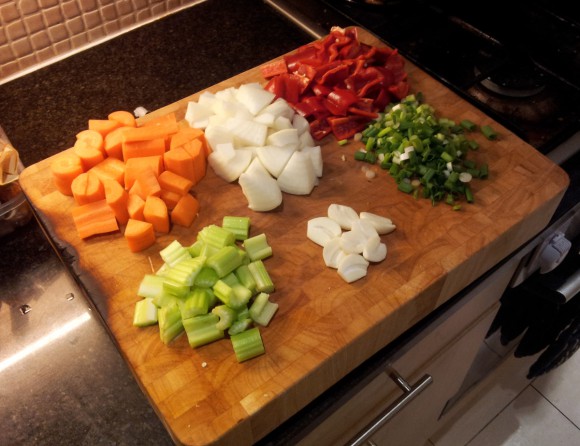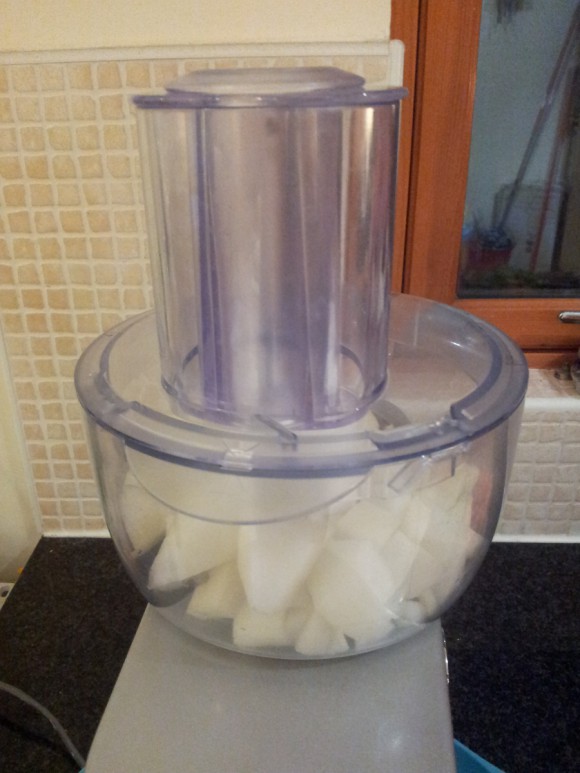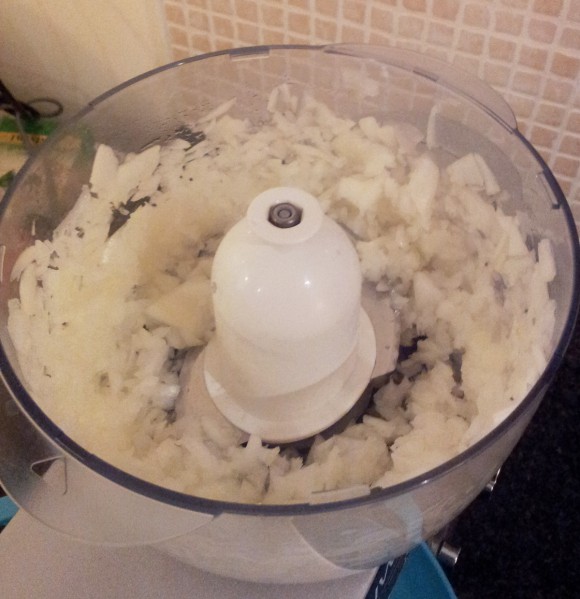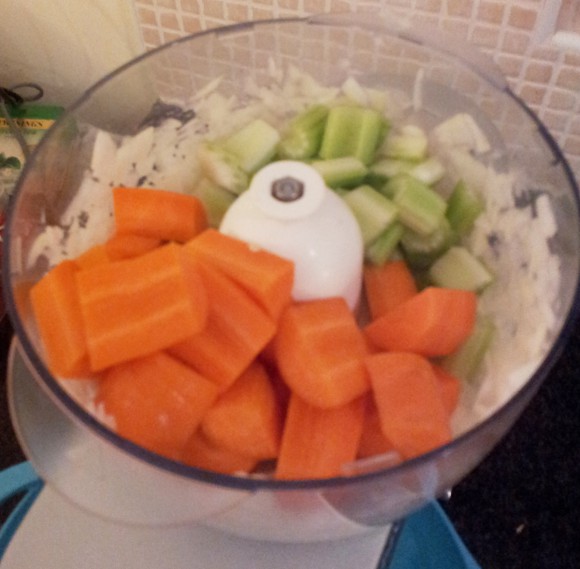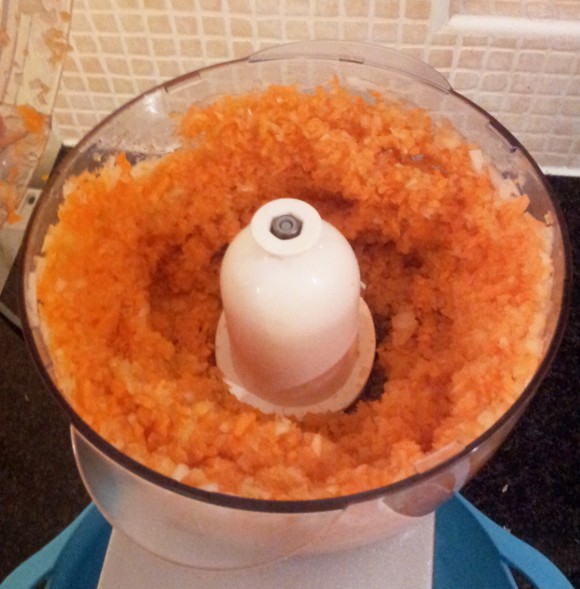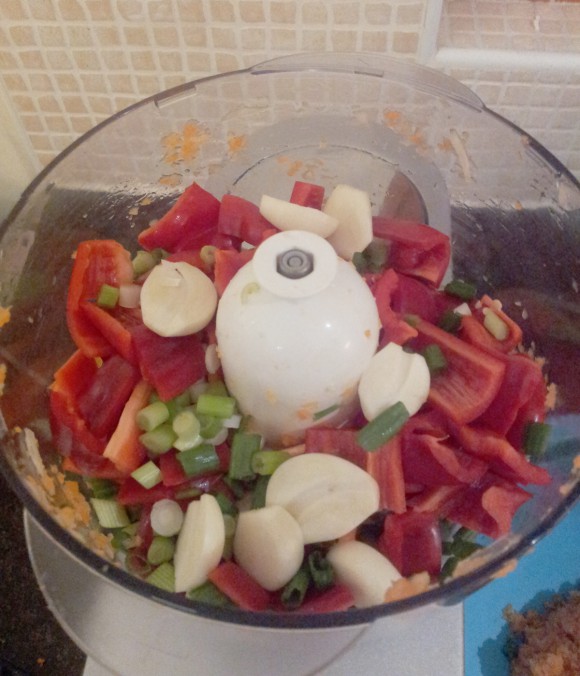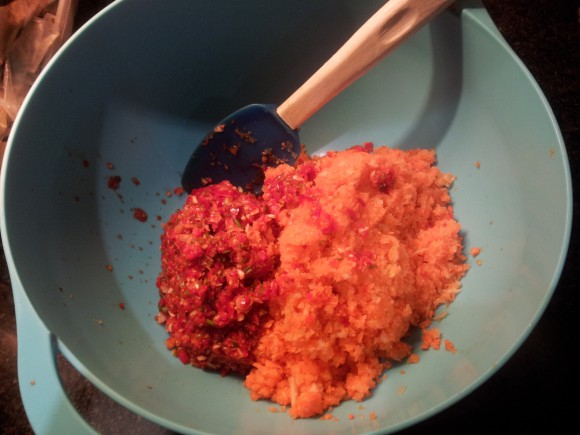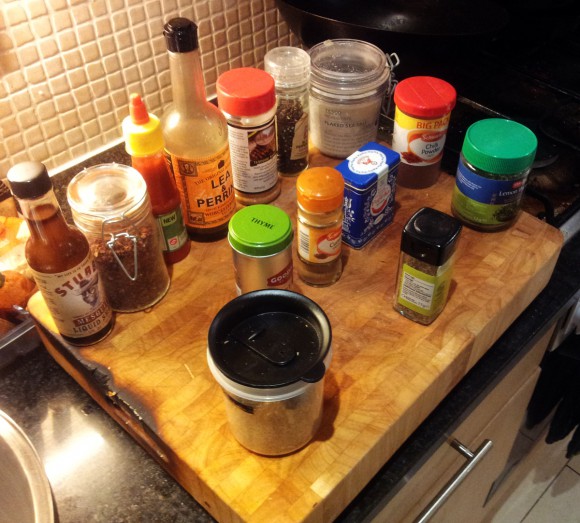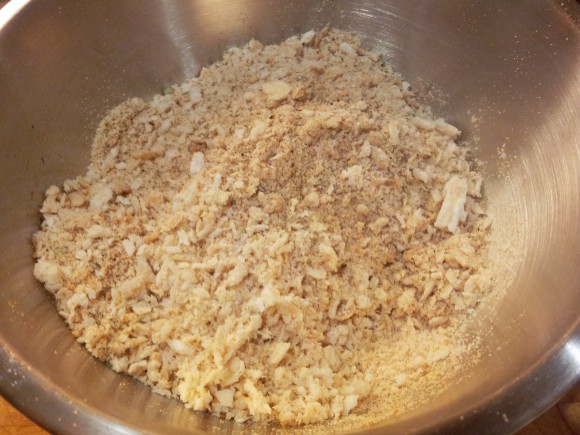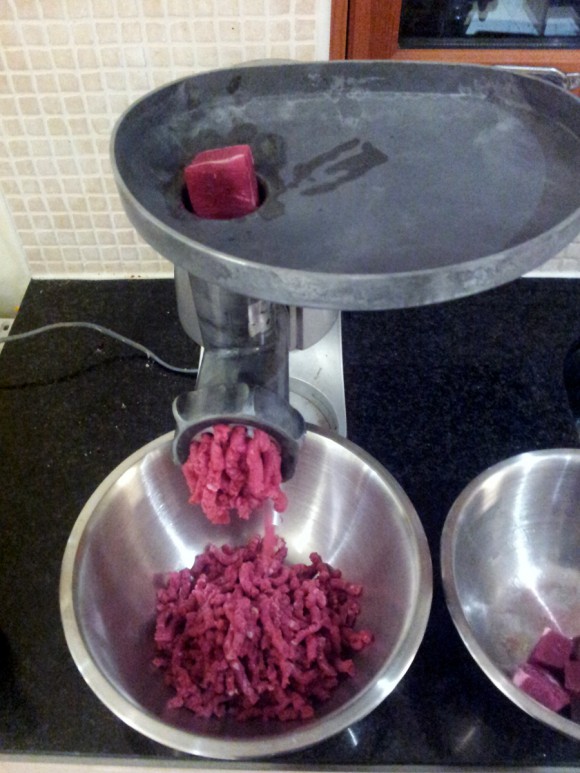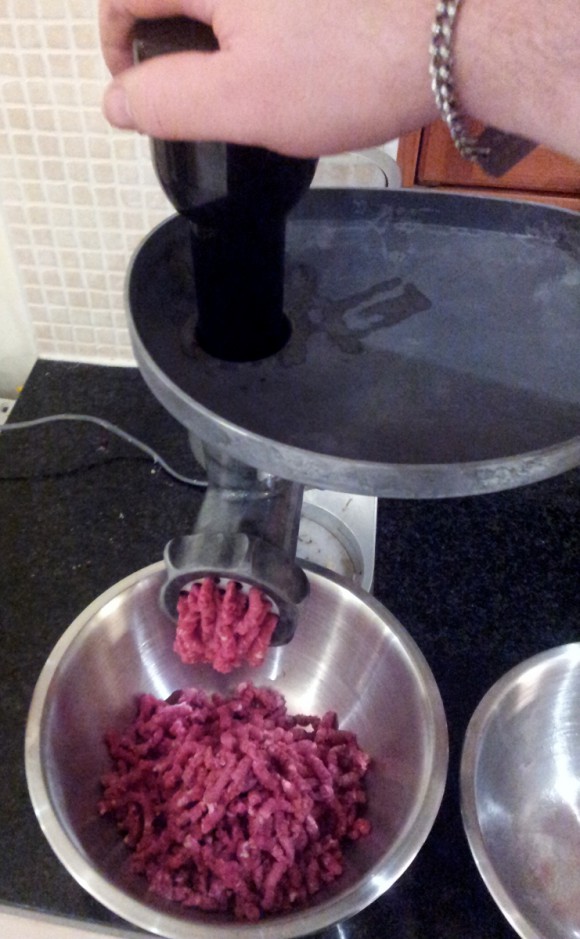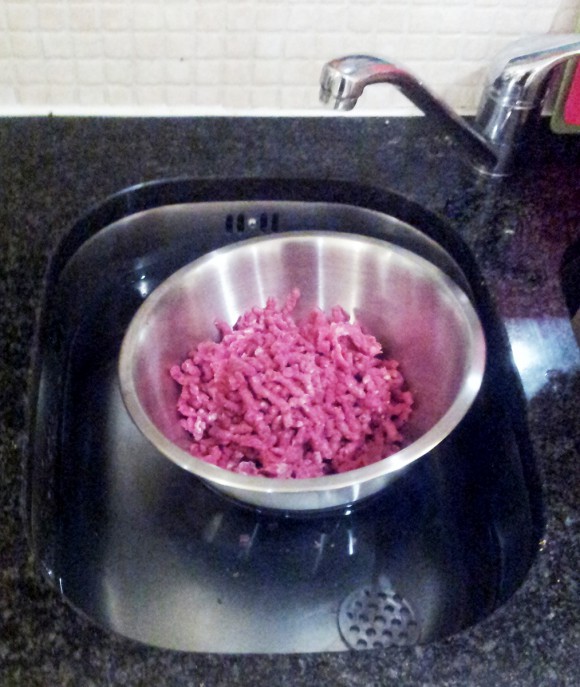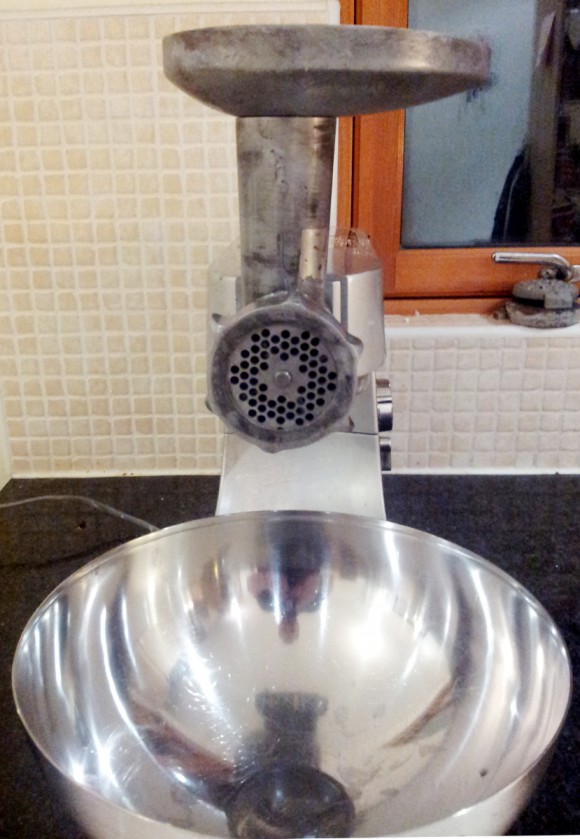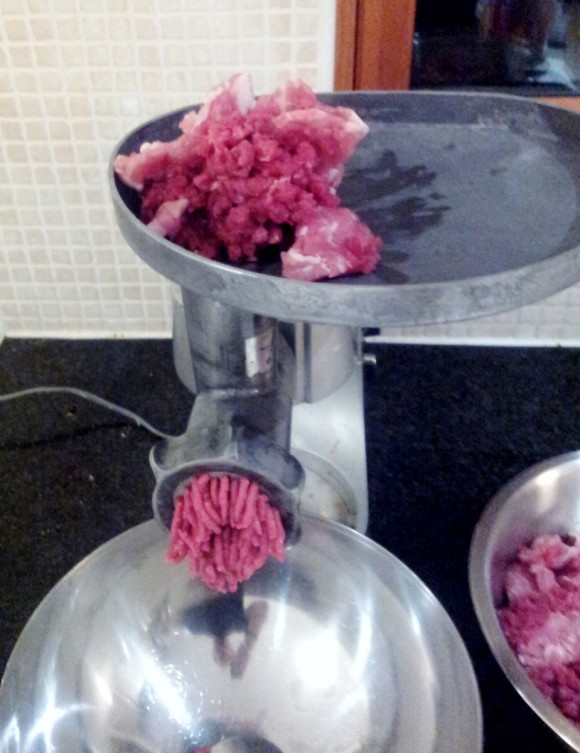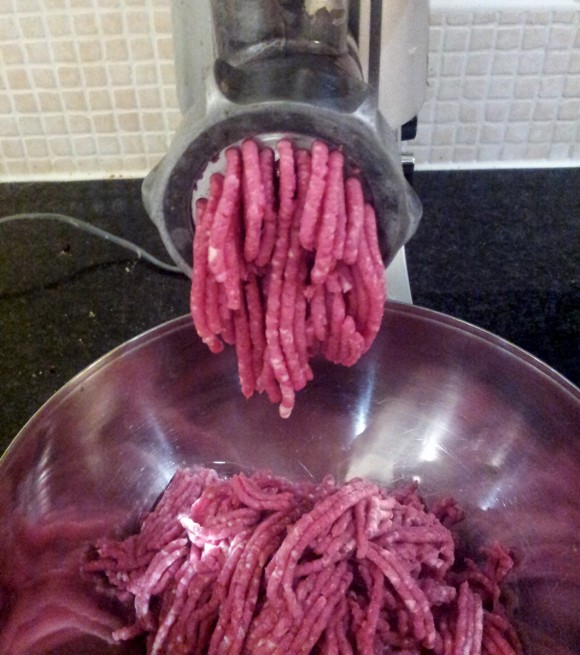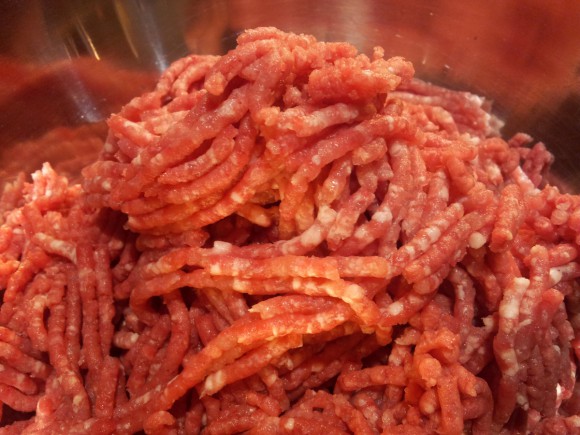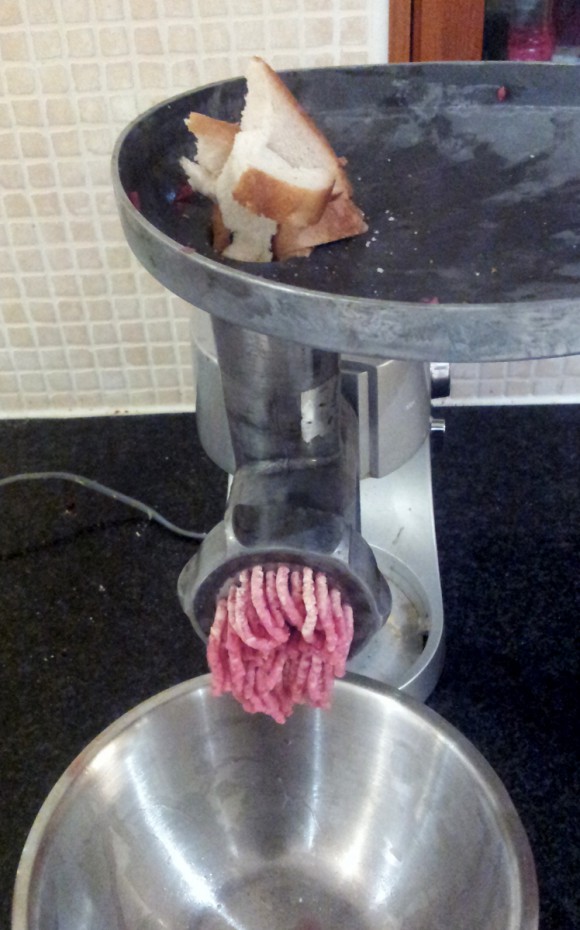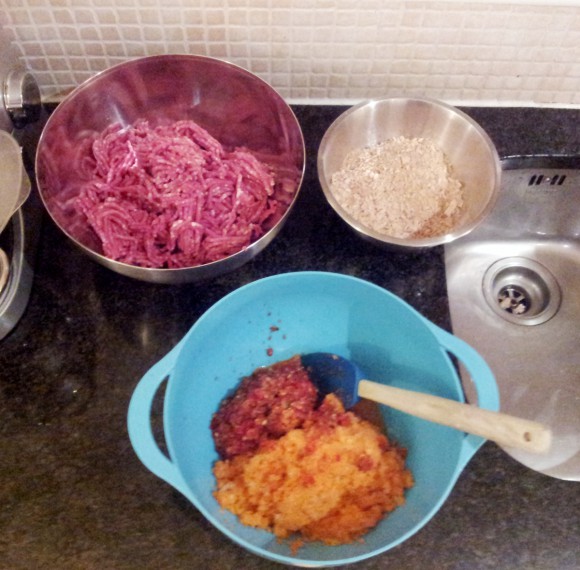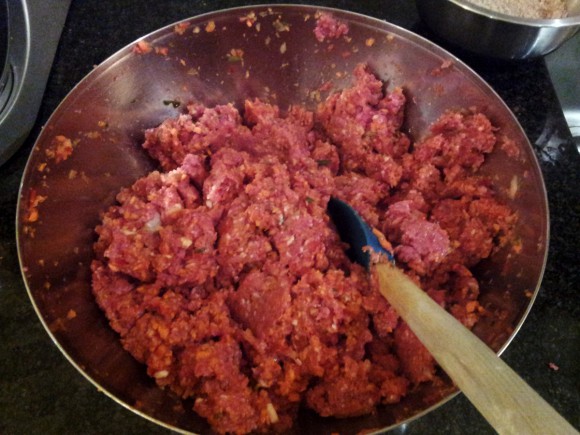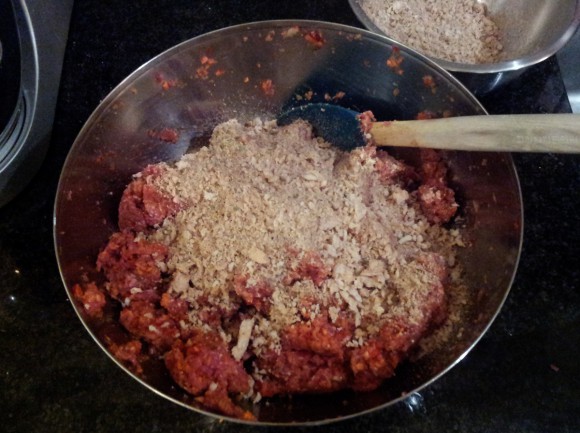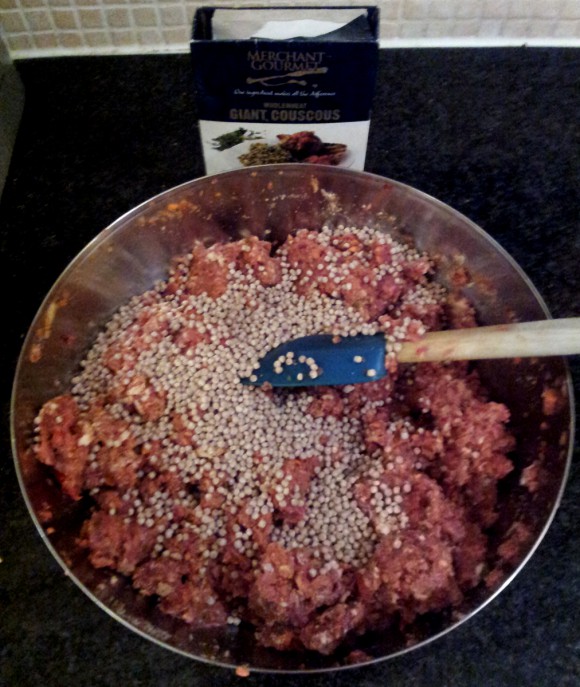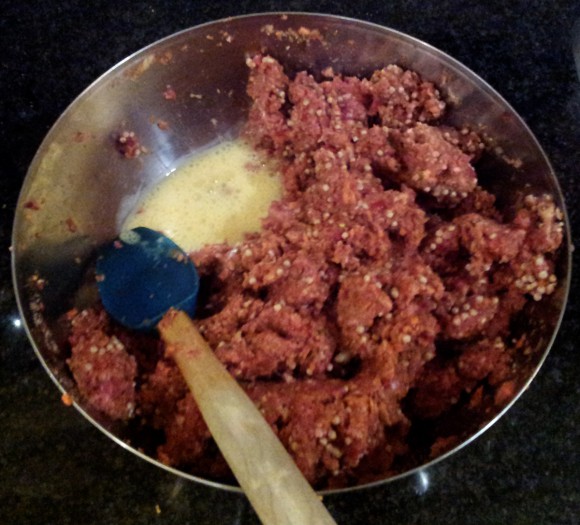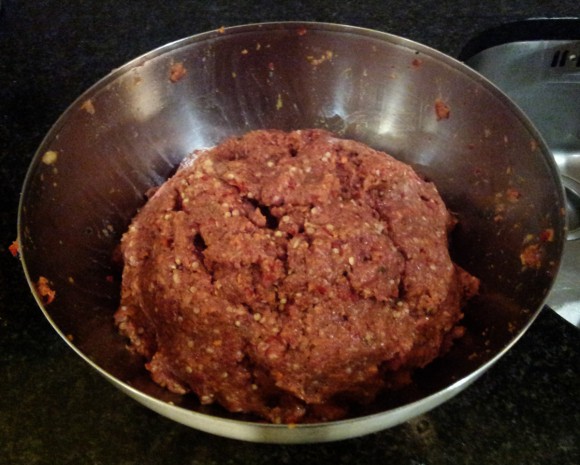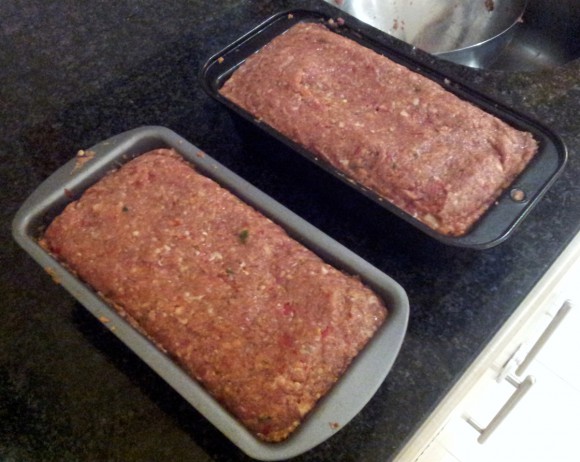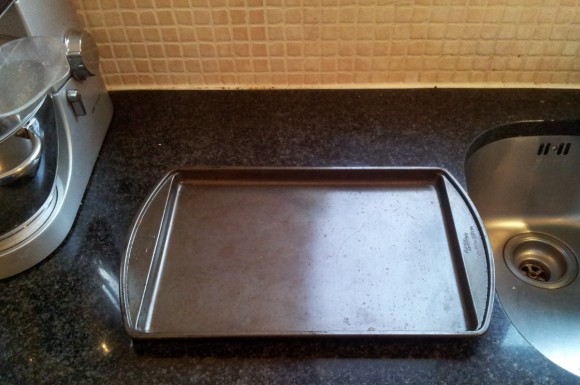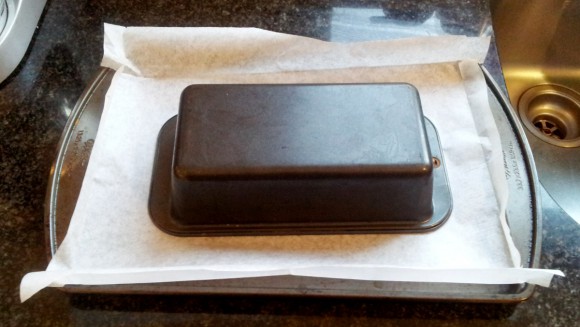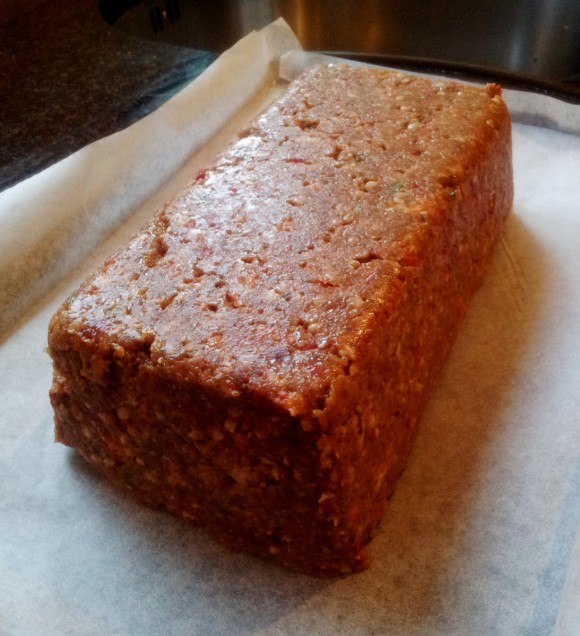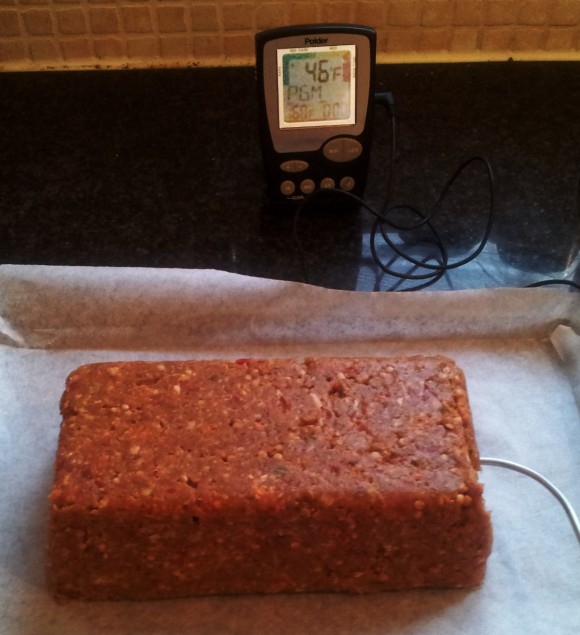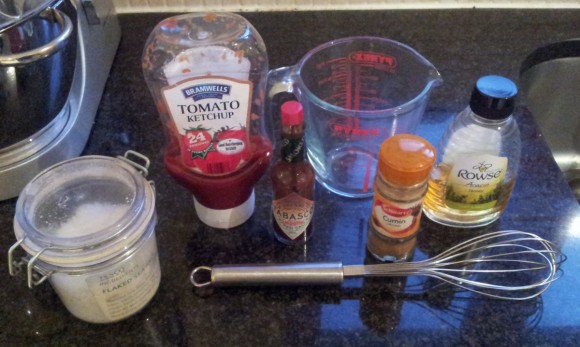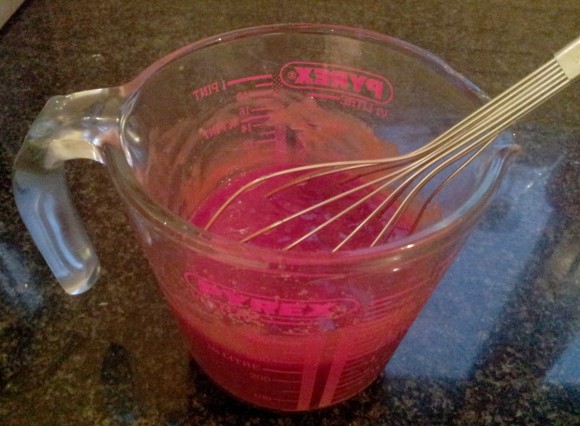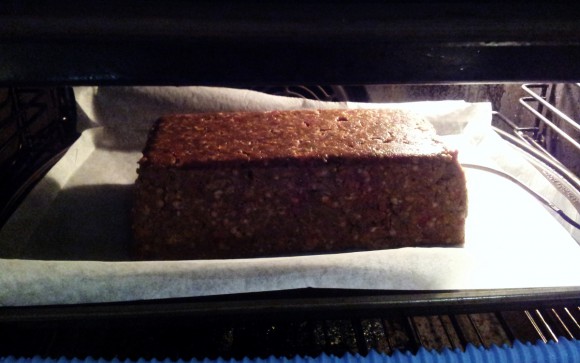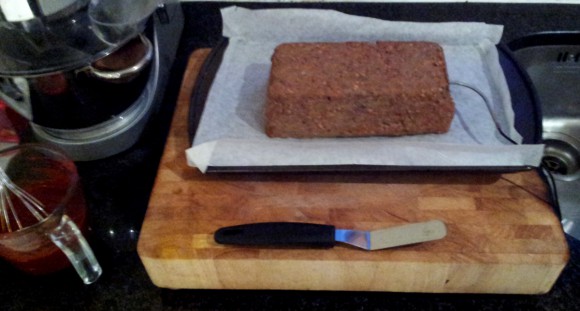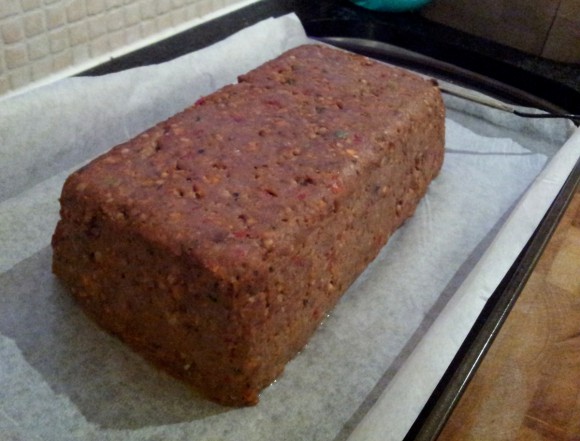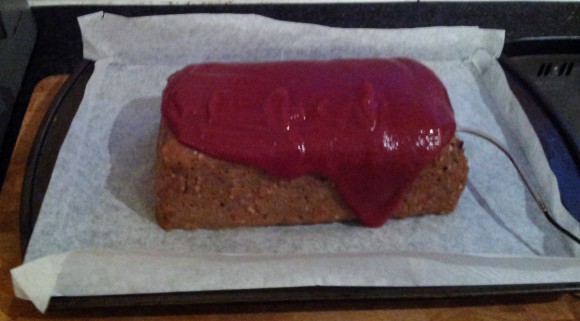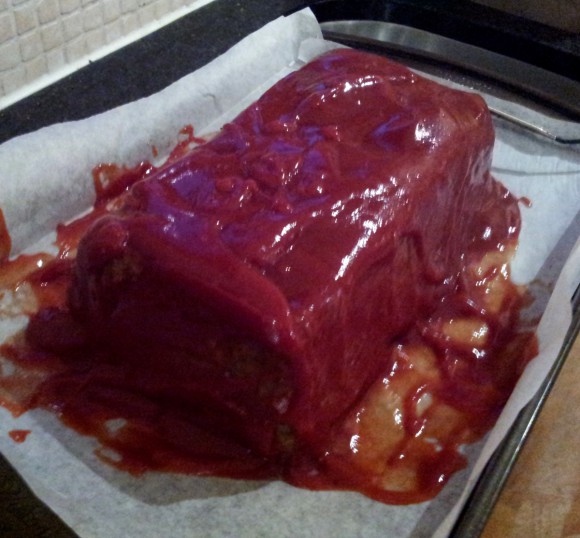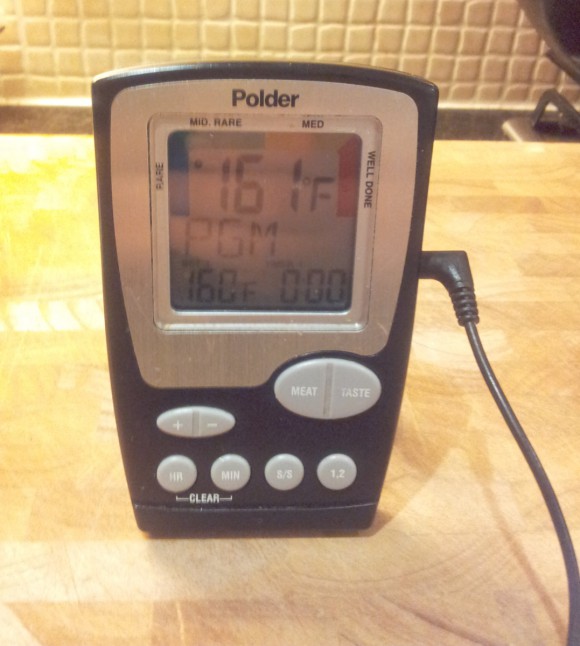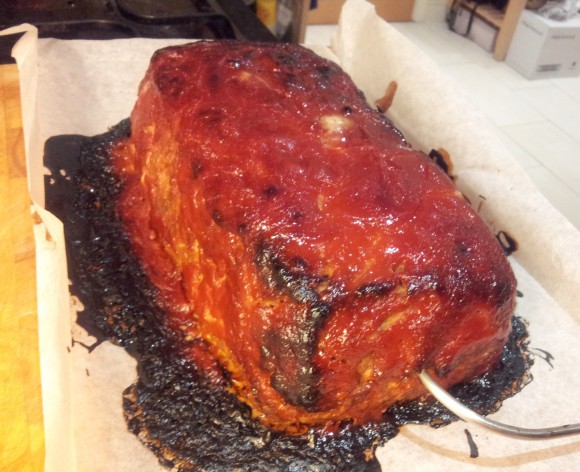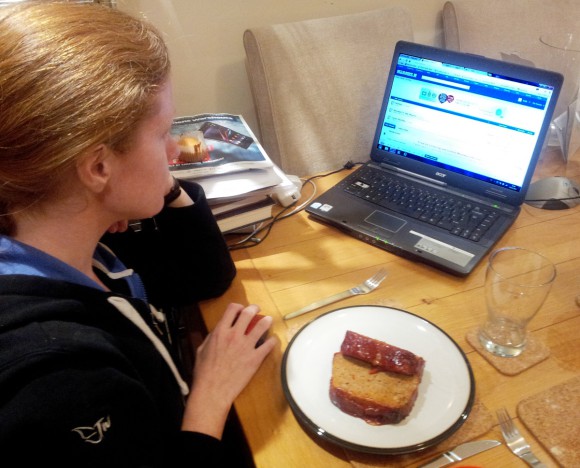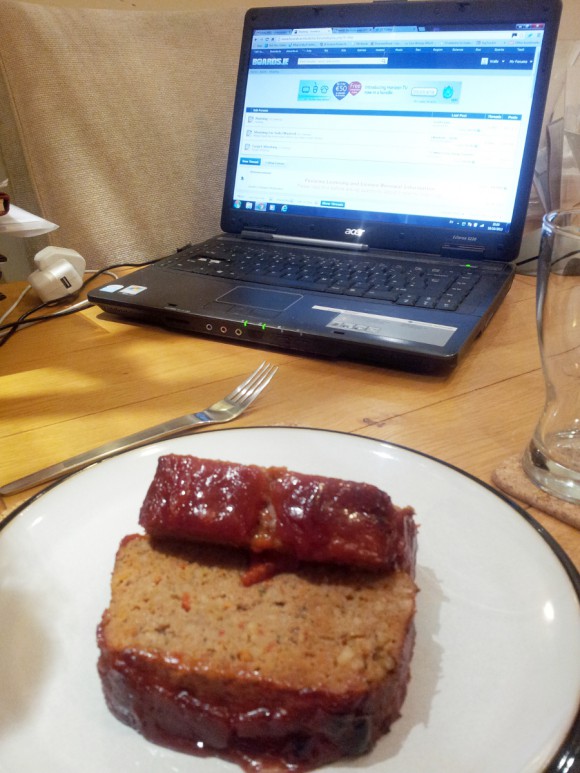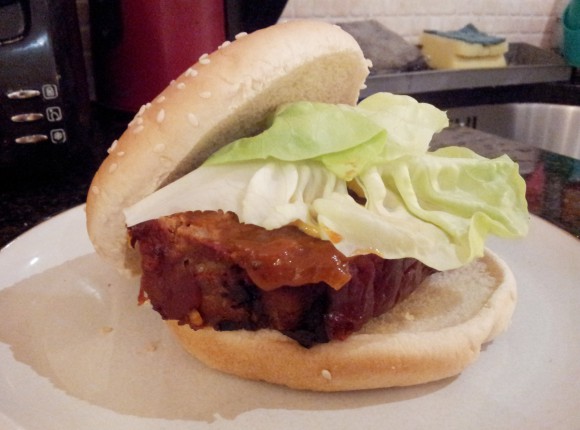[stextbox id=”info”]Now a Cooking Club recipe on Boards.ie as well…[/stextbox]
Okay, recipe time again, and again going with an American classic, this time meatloaf (yes, I know, we did it before, but this one’s different). And as with all recipes, we start with a history lesson. Born Marvin Lee Aday in September 1947…. ah. Right, sorry, wrong notes, give me a second…
FINELY CUT PULP [of pork] IS GROUND WITH THE HEARTS OF WINTER WHEAT AND DILUTED WITH WINE. FLAVOR LIGHTLY WITH PEPPER AND BROTH AND IF YOU LIKE ADD A MODERATE QUANTITY OF [myrtle] BERRIES ALSO CRUSHED, AND AFTER YOU HAVE ADDED CRUSHED NUTS AND PEPPER SHAPE THE FORCEMEAT INTO SMALL ROLLS, WRAP THESE IN CAUL, FRY, AND SERVE WITH WINE GRAVY.
That’s Apicius de re Coquinaria, a 5th century Roman cookbook of sorts, and that does appear to be a kind of meatloaf-ish recipe (“hearts of wheat” refers to very fine wheat flour). Though if you make it, it doesn’t so much look like meatloaf as… I dunno, a peanut biscuit made with meat that’s gone even more wrong than it sounds?
But there are recipes from all over the world that are kinds of meatloaf-ish things – Lihamureke in Finland, Hackbraten in Germany, Kofta in most of the middle east, Bobotie in South Africa, and хучмал in Mongolia (and if you can pronounce that, well done…). So if there are so many dishes from so many places, what is “meatloaf” in the American sense and why do we say it’s American at all?
Turns out, it’s the same answer to both questions. The absolute must-have ingredients in meatloaf are minced meat, filler, and a loaf shape. (Yes, I’m counting the shape as an ingredient, go show me the difference between a bundt pan and an angel food pan if you think shape’s irrelevant to the dish 😛 ). The minced part of the minced meat is the key to the second question – look at that Roman recipe again and you’ll note it talks about finely cut pork, not minced pork. Prior to 1900 or so, cooks took the meat for their meatloafish dishes, put it in a large wooden bowl, took something like a mezzalune and spent a half-hour hacking the meat to tiny tiny bits. Which, given that you don’t make mince from prime cuts of meat, wouldn’t have been a terribly light job. So while these dishes could stretch out tough meat to feed more people, they weren’t really easy to prepare (also, when you cut up a chunk of meat you massively increase its surface area, often by a few thousand times, and that gives a lot more access to the meat to bacteria in the air, so all that hard work prepping the meat had to be done right before cooking).
Then, around 1900, meat grinders began to appear on the market (invented by the man who would go on to invent the first bicycle and I know there’s a joke in there somewhere but I’ve not found it yet). This happened at the same time that refrigeration began to be used, not so much in homes, but for transporting beef around the US. So suddenly it was easy and fast to buy meat and to grind tougher cuts of meat to tender mince (the grinders were hand-cranked but could mince a pound of meat in about a minute as opposed to about a half-hour of hard work before that). And the various immigrants in the US all had recipes for meatloafish things made with chopped meat, so they adapted and started using mince, and so meatloaf proper was invented as an American dish.
But the reason meatloaf became so popular in the US came twenty years later, when the great depression hit and suddenly meatloaf was a poor person’s recipe in the middle of a lot of poor people and it was suddenly being made everywhere. And after the great depression, companies like Heinz and Campbells, who were taking lessons learnt about tinning and food preparation for tins from the first world war and using it to create and dominate markets in things like tinned soup and ketchup, started promoting recipes that could use their products and meatloaf was one of the main contenders. The reduction in the availability of meat during the second world war just secured the popularity of meat loaf again, and it’s never really been out of fashion in the US since (it’s even had two or three bouts of being considered gourmet fare, but it’s recovered every time 😀 ).
In Ireland? Yeah, I don’t remember ever eating meatloaf growing up, but then I didn’t know herbs came in anything other than “mixed” for most of that childhood either. But it doesn’t seem to be hugely popular here yet. However, we’re all poor now, so maybe that’ll change 😀
Okay, enough history, on to the food. With a quick pit stop for equipment. See, proper meatloaf is utterly tied to one piece of kitchen equipment – the mincer (doesn’t matter if the butcher used it before you bought the mince, you still needed one to exist to make meatloaf). Most kitchens don’t have their own these days. Hey, no big deal, just buy some mince from tesco or whomever if you don’t want to spend twenty euro (including P+P) on a hand mincer on ebay that’s cool. I mean, horse mince is meat too…
😈
Seriously though, hand mincers haven’t changed since 1900. They’re cheap, sturdy, useful and fairly small so relatively easy to store. Worth thinking about. In my case, I splurged and bought one as an attachment for my Kenwood Chef. If you have one of those, they’re great, but there’s a quirk or two – more on that as we go. But for now, kitchen equipment porn:
I’ll be using the liquidiser and the food processor for this recipe too, because why not? Okay, now the ingredients. I’m going to take these in two parts (I’ll put a shopping list at the end), first the meatloaf itself and then the glaze. So, here’s the meatloaf ingredients:
At the back, we have the meat – two round steaks from Aldi, and some bacon offcuts, also from Aldi. The round steak is just nothing fancy, they weigh around 400g each and cost about three to four euro. The bacon offcuts might not be so familiar — Aldi actually sell those as “bacon offcuts” and they’re brilliant because they’re cheap, there’s usually a nice amount of fat in there for mince, and you’re not using a nice rasher for something that really you can do better with trimmings. Sometimes they’re offcuts from rashers, sometimes from whole slabs of bacon, either is grand. If you can’t find these, just use back bacon or rashers (see the chilli recipe for details on back bacon, if you need details on rashers, you’re either not Irish or beyond help). Don’t want to use bacon? Got lamb? Pork? Veal? All are good for this, alone or in combination (in much of the US, a 1:1:1 mix of beef, pork and veal is the standard meatloaf mix, but I prefer my 2:1 beef:bacon mix).
I’m buying everything for this meatloaf from Aldi (bar some of the spices which I had from a shopping run to Tesco – again, this is poor people food, so the idea is not to need a side trip to spend a three figure sum in Fallon&Byrnes or to order something from Outer Mongolia over the internet). In terms of amounts, one steak will generally do one meatloaf which will feed up to six people if you’re also doing mashed potatoes; but I generally do a batch of two (which is what we have here) and freeze the uncooked meatloaf (more on that later).
The rest of the ingredients are straightforward – some bread (stale if you have it, the harder the better but avoid mold; if you don’t have stale bread, take a few slices of ordinary panloaf bread, about two per steak, and put them in a 100C oven for 15 minutes or until they’re dry to the touch and look like really really pale toast – don’t actually toast them, you just want to dry them out) to act as the filler along with some spices that I’ll get to in a minute, and some couscous that I like to add later on; two eggs to act as a binder (generally one egg per steak); and assorted veggies because they make it taste better.
The veggies themselves are something you can vary for taste – I like to start with a normal mix of onions, carrots and celery; then add some garlic, some peppers and some spring onions. But you can use whatever is in the pantry/fridge/shopping bag. Meatloaf is fridge velcro that way, most poor person food is.
Okay, first prep first. Take your meat and put it in the freezer. Now go have a cuppa for at least a half-hour. I just stuck the steaks into the freezer when I got home from the shop and didn’t pull them out until the evening I was prepping the meatloaf. Temperature is an issue with mincing – you want everything nice and cold, because then the fat stays solid and gets cut up and distributed evenly through the meat instead of melting and pooling everywhere or partly melting, getting soft and smearing instead of cutting when the mincer hits it. So stick all the meat in the freezer until it’s hard; and freezing and defrosting it isn’t going to ruin the meal either. I forgot to freeze the bacon while cooking this, and it made things just that bit harder as a result. So don’t do that.
Now take your frozen steaks and a nice sharp knife and trim off anything that’s too gnarly (but don’t trim off the fat, you want that for the dish), and then cut the steaks into two-inch chunks. Big honking pieces, please.
So I have almost 800g of meat here. I want around about a 2:1 beef:bacon ratio in the final mix, but I’m not hugely fussy so I cut off a chunk or two of the bacon offcuts (here I cut too much, but meh, it’s bacon, it’s all good):
You can see here that this week the offcuts are from rashers (last week it was from solid cuts). No worries, it’s all for the mincer anyway. And yeah, it’s 8:5 rather than 2:1 but that’s okay. Now chop that bacon down to roughly two-inch chunks (very roughly if it’s rashers as in this case):
Don’t mix the two meats yet, keep the chunks in different bowls please. And if you have any offcuts left over, into the ziptop bag they go and into the freezer with them (it’s poor people food, so please, no wasting stuff).
Now, onto the veggies. We don’t need to break them down to fine dices or juliennes here, we just need to get them roughly chopped so they’ll fit into the food processor better. If you’re taking more than five minutes to do all this lot, you’re being too prissy about it (though I did take the time to remove the central green bit from the garlic ‘cos the sprouts taste a bit bitter).
Now, it’s choppin’ time. Start with the onions, load them into the food processor.
Now give them a few pulses just to break them down to this sort of consistency, where they’re basicly at a rough dice level (do this now because you want the onions a little more processed than the carrots – a chunk of carrot in meatloaf is nice, a chunk of onion, meh…).
Now load in the rest of the mirepoix (that’s carrots and celery to you and me).
And pulse away until you have something that looks like this:
You don’t want a puree, but you do want it fine-grained, almost looking like a mash at first glance. If you screw up, meh, the meatloaf will just be a little more chunky. No big deal. Now dump those veggies into a bowl and do the rest (you don’t just throw them all in ‘cos it can’t handle that much food, and if you just threw the rest in with the stuff in there now, you’d get bits floating in a carrot and onion soup).
And pulse away, then dump it all into a bowl with the mirepoix mix and set to one side.
Now, next up, breadcrumbs, and it’s the liquidiser’s time to shine…
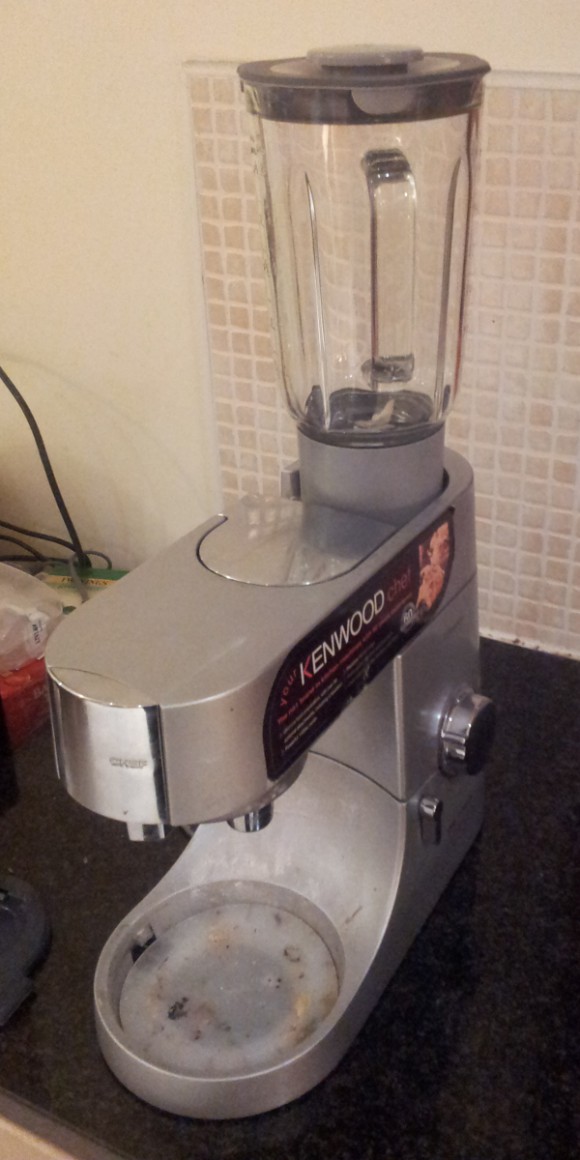 Take your stale bread or your dried-out-in-the-oven fresh bread and tear it into chunks, and feed those into the running liquidiser one at a time until you have a nice cyclone of breadcrumbs bouncing around in there. Feed them through the removable plug in the lid, not by taking off the lid, unless you like cleaning breadcrumbs out of your nose, off the top of cupboards and from every other surface in the kitchen. Then start adding the herbs and spices (the filler is the best way to get those into the loaf really). I tend to use… a lot of them.
Take your stale bread or your dried-out-in-the-oven fresh bread and tear it into chunks, and feed those into the running liquidiser one at a time until you have a nice cyclone of breadcrumbs bouncing around in there. Feed them through the removable plug in the lid, not by taking off the lid, unless you like cleaning breadcrumbs out of your nose, off the top of cupboards and from every other surface in the kitchen. Then start adding the herbs and spices (the filler is the best way to get those into the loaf really). I tend to use… a lot of them.
Back row, left to right, is liquid smoke, szechuan peppercorns, hot sauce, worstershire sauce, garam masala, pepper, salt. Next row, left to right, is thyme, cumin, smoked paprike and chilli powder (store-bought, I know, I was out of the chillis I use to make my own so I saved time). Lastly in the front we have the Honkin Great Tub of oregano (She Who Must Be Obeyed is a fan of it), sage and my new favorite, lemon thyme, which tastes like it sounds it would. Sort of. And doesn’t have those little twiggy bits you always get in regular thyme.
That’s a lot of stuff? You don’t want to do that much shopping? That’s cool. Salt is the only one of those that you have to have. The rest add flavours and are lovely, but if you don’t have them, just leave them out, or use whatever you normally prefer yourself.
The liquids here aren’t going into the filler; they’ll go into the mince directly later on. But for now, to the running liquidiser add a half-teaspoon of szechuan peppercorns, a teaspoon of garam masala, a few good grinds of pepper, two hefty pinches of salt (that’s sea salt, so about a teaspoon’s worth), a teaspoon of cumin, a teaspoon of smoked paprika, a half-teaspoon of chilli, a half-teaspoon of sage, a teaspoon and a half of oregano and a teaspoon of lemon thyme. I don’t tend to us the ordinary thyme anymore, I just listed it here because lemon thyme’s awkward to find, so just use the same amount of thyme if you can’t find it. All that goes down the chute of the running liquidiser into the breadcrumb snowstorm (or you add it all to the liquidiser before starting it off, but that may not work so well depending on your liquidiser). You could do it in the food processor as well, but I just got that all covered in vegetable juice a few paragraphs ago and now it’s in the dishwasher. Don’t worry about completely perfect homogenous particle sizes either, btw – it’s breadcrumbs, not particle physics. You want something like this when you’re done:
Okay, moving on now to the meat. Here’s the setup:
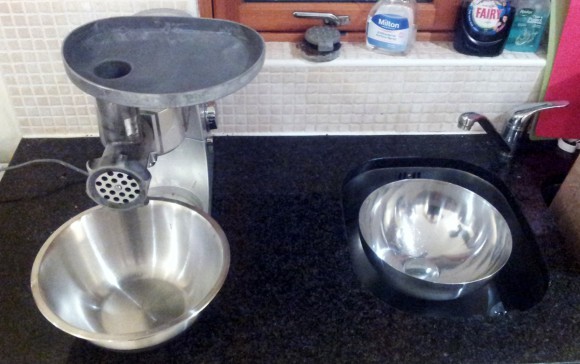 Mincer is setup with the coarse mince plate in place. We have two bowls, and the one not in use is floating in an ice bath (we want the meat to stay cold, don’t forget). One little tip – see that retaining ring that screws onto the end to hold the mincer plate in position?
Mincer is setup with the coarse mince plate in place. We have two bowls, and the one not in use is floating in an ice bath (we want the meat to stay cold, don’t forget). One little tip – see that retaining ring that screws onto the end to hold the mincer plate in position?
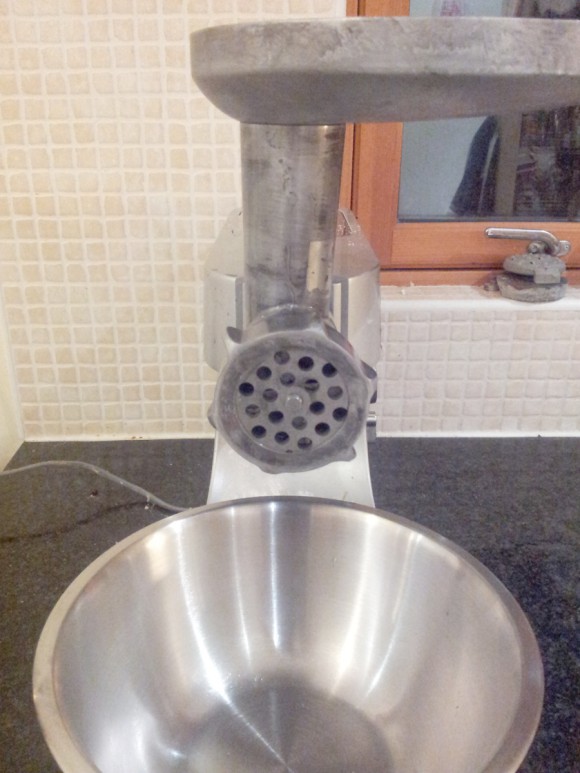 Yeah, that one. Don’t under-tighten that. Your mincer came with a wrench-type thing. Use it. Because otherwise the meat will come squirting out around the plate instead of through it and that’s just nasty to clean up.
Yeah, that one. Don’t under-tighten that. Your mincer came with a wrench-type thing. Use it. Because otherwise the meat will come squirting out around the plate instead of through it and that’s just nasty to clean up.
Not that that’s ever happened to me, of course, because I’m perfect. Ahem.
Right, onto the mincing. Start with the chunks of round steak. Feed them one at a time into the hopper and don’t overload it – this is what you want to think of as fully laden:
And keep the speed on the mincer low if you’re using one of these attachment models (and crank slow if it’s a hand crank). Do it too fast and friction heats the metal, which heats the meat and the fat melts or softens and stuff gets messy.
Use the plunger if the meat isn’t vanishing into the mincer like a swimming extra in Jaws — most of the time, it will. Whatever you do, don’t shove down on the plunger. Just rest your hand on it and let gravity do the shoving. Push too hard and the pressure on the meat in the mincer rises too high and then it comes squirting out of any joint in the mincer, like between the hopper and the mincer itself, and that’s a pain to clean up.
Not that that’s ever happened to me, of course, because I’m perfect. Ahem.
Now, once you’ve run all the beef through the coarse mince, take the bowl from the ice bath and swap it with the bowl containing the mince. Now take off the coarse mincing plate and swap that with the fine mincing plate. You will find that there’s some meat left in the mincer that didn’t force itself out through the plate – discard anything that’s all gnarly connective tissue and throw anything that’s just meat into the bowl with the mince. I usually ditch the coarse mince plate into the ice bath too, just to rince off the gunk. But I’m lazy 😀
Okay, good to go for the second and last round of mincing. Grab your bacon chunks now as well, and we’re going to mix them in with the coarse mince mix and feed the mix through the mincer. You can work with slightly larger amounts for this because most of the breaking down is done.
See how we’re just feeding both bacon and beef into the mincer at once? Can’t get that kind of mixing if you just buy minced pork and minced beef and stir them together in a bowl…
And just continue feeding in the stuff and using the plunger occasionally until it’s all minced through. If you’ve done it right, you’ll now have a bowl full of this sort of thing:
Nice colour, good even distribution of fat, and a good mix of meats. This stuff makes good burgers and meatballs by the way (and the coarse mince above is really good for the chilli recipe).
Now, before you do anything else, clean the mincer. Look, seriously, if you don’t keep that thing cleaner than a NASA clean room, you’re going to get some new and interesting food bug that lets you get on very familiar terms with your bathroom tiles, at best. And you have it set up now, so just take some more stale bread (fresh will do in a pinch) and feed it through the machine:
The bread will clean almost all the meat out of the machine and do most of the work for you. Just take the mincer apart after this (it only has five or six bits) and clean out the bread bits left inside and any meat emulsion left clinging to anything, use a skewer to clean the holes in the mincing plate and shove the whole thing into the dishwasher and forget it.
Right, final phase of the prep now. You should have a bowl of mince, a bowl of breadcrumbs and a bowl of veggies. Now, take the liquids from the spice picture before and add them to the meat. A good few splashes of worscestershire sauce, the same of hot sauce and a bit of liquid smoke if you like that sort of thing. Take your spatula and cut it into the meat the way you’d cut something into flour in baking:
When it looks mixed, add the breadcrumbs in two batches and again, cut them into the mince:
At this stage, I like to add some giant couscous as well (about one handful to a steak). But that’s just me, skip it if you don’t want it or can’t find it.
Okay, now beat the two eggs and add them to the bowl:
Now, at this point, the spatula won’t cut it anymore. You have to wash your hands, remove your wedding ring or other jewellery and get into the mix with your fingers, mixing it up and getting it homogenous. Don’t squish it though – just picking up handfuls of meat and trying to turn them into a diamond, Superman-style, is only going to lead to tough rubbery meatloaf. Be gentle.
And that’s the end of the prep work for the meatloaf. Take your mince now and divide it between two loaf tins. Don’t be overly prissy about it:
Normally at this point, I’ll freeze one and cook one, but in this case I couldn’t cook them that night so one went in the freezer and the other went into the fridge to cook the following day. Just wrap them in clingfilm or glad wrap and they’ll freeze fine for months. In the fridge I would’t go more than two days – it’s a mix of minced meat and raw eggs for pete’s sake…
Right, so the next day, take a baking tray or sheet…
And line with parchment paper. Remove the glad wrap from the loaf tin and then quickly slap it down on the parchment paper:
Now notice that the meat’s still stuck in the loaf tin. Drop the loaf tin onto the parchment a few more times, then pick up the tray and slam it down a few times, then take a mallet and hit the loaf tin repeatedly, then give up, turn over the loaf tin, run a knife around the sides between the mince mixture and the tin, re-invert it over the parchment and remove the mince within (yes, you could skip some of those steps, but it wouldn’t be as funny to observers if you did):
Nice. Especially since you can’t see the other end where some mince remained stuck to the loaf tin…
Okay, now take a probe thermometer and shove the probe into the meatloaf to the center of the loaf, set the temperature alarm to 155F (70C) or a little higher if you have little kids who’ll be inhaling this stuff, preheat your oven to 325F (160C), and put the meatloaf into the oven to bake.
Now, you want the meatloaf in the oven for just a few minutes first, just to dry up the surface a tad so you can glaze it, so this is the perfect time to make the glaze. This is the second half of the ingredients list:
Left to right, we have a pinch of salt, two thirds or so of a cup of tomato ketchup (I went with 200ml), a good few splashes of hot sauce (yes, that’s a different brand than what went into the meatloaf, because I am a wild and crazy person you see), about a half-teaspoon or so of cumin, and about a quarter-cup of honey. All of that goes into the jug and gets whisked until it looks like you have a jug of slightly darker ketchup. Honestly, it’s about three minutes work if you milk it.
Now, after the meatloaf’s had ten minutes in the oven, pull it out:
See how the surface is slightly drier and easier to glaze?
See?
Well, take that glaze and pour the whole lot over the top of the meatloaf:
Don’t be all fussy about it, just spread it evenly-ish on the meatloaf and let it spill over each side until you’ve covered the meatloaf entirely, and any that runs off and pools on the parchment, scoop up and leave it on the top of the meatloaf (it’ll run off and baste the meatloaf while cooking):
It will be messy. Don’t worry, doesn’t matter, this isn’t a wedding cake. Now stick the whole thing back into the oven and set your thermometer for 160F and go do something else for the 30-40 minutes or so this will take. Clean the kitchen, perhaps.
Then, after 30-40 minutes of cooking, you should see something like this;
Don’t worry about the black on the parchment, that’s the honey burning. Likewise on the meatloaf glaze itself; that’s just par for the course when you have a schizophrenic oven…
Give it five minutes to rest, then pull the probe and use your electric carver to carve out one inch thick slices (you can’t cut meatloaf thin, it falls apart). Normally you would serve with mashed potatoes, but these have so much veggie matter in them that they’ll do fine even without the spuds.
Serve to an appreciative audience. Or, you know, let it get eaten while people browse boards…
So there you have it, my candidate for the Official Boards.ie Meatloaf Recipe:
But the thing about meatloaf is, you won’t finish it on night one. So what about night two? Well, you can just reheat it in the oven (20 mins at 140C does a good job). But you can also try the infamous Meatloaf Sandwich:
Lightly toasted bun (or just plain toast); some tomato relish and mustard and some lettuce on top of the slice of meatloaf. Delicious.
And there are other leftover options too – battered and deepfried, panfried, and so on. Also, if crumbled up a little, it’s great toddler food (though by 18 months, you just cut it into cubes, not crumble it).
[stextbox id=”info”]
Ingredients list (makes two meatloaves):
Meatloaf:
- 800g round steak (usually that’s two steaks)
- 400g bacon (either offcuts, or back bacon, or rashers)
- 2 eggs
- 2 red peppers
- 4 slices of stale panloaf bread
- 1 bunch of spring onions
- 2 sticks of celery
- 1 large onion
- 4 cloves of garlic
- 2 carrots
- 2 large pinches sea salt
- 1/2 tsp szechuan peppercorns
- 1 tsp garam masala
- a few good grinds of pepper
- 1 tsp cumin
- 1 tsp smoked paprika
- 1/2 tsp chilli powder
- 1/2 tsp sage
- 1 1/2 tsp oregano
- 1 tsp lemon thyme (or ordinary thyme)
- 1 cup giant couscous
- a few splashes of hot sauce
- 1 tbsp worscestershire sauce
- a splash of liquid smoke
Glaze:
- 200ml tomato ketchup
- a few splashes of hot sauce
- 1 tsp cumin
- 1/4 cup (say, 60ml) honey
[/stextbox]
Tags: recipe
